Inside 3675 Market, Philadelphia’s Newest Innovation Hub
The uCity Square development, a major collaboration between partners like the Science Center and Cambridge Innovation Center, is taking Philly’s entrepreneurial ecosystem to new heights. Here’s how.
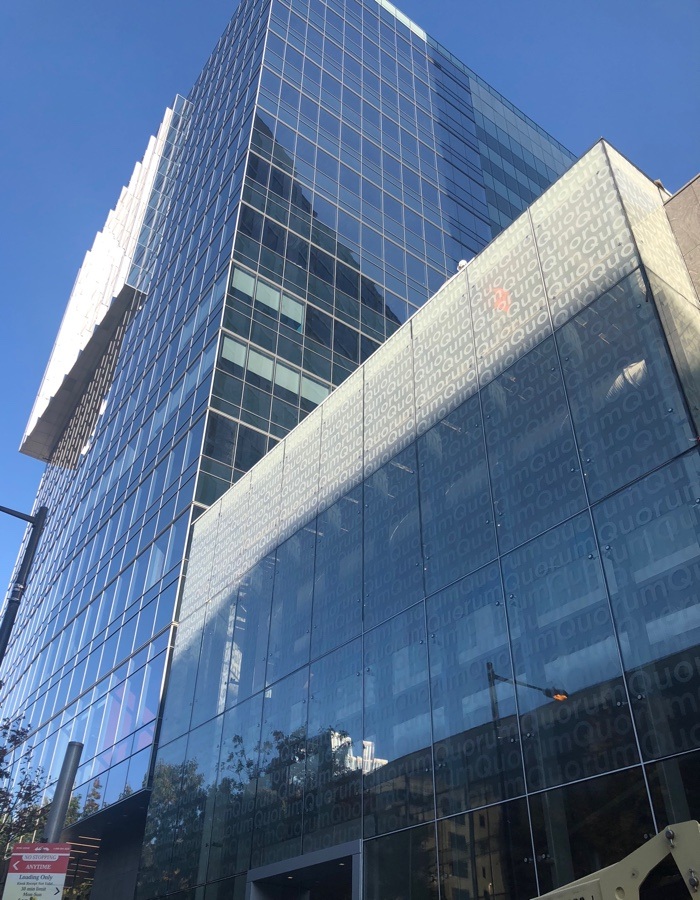
Outside 3675 Market Street | Photo by Fabiola Cineas
On November 9th, 3675 Market Street will officially open its doors to the public about two years after its ceremonial groundbreaking. So far, the 14-story building is exactly what its partners — the Science Center, Cambridge Innovation Center (CIC), Wexford Science and Technology, BioLabs and Ventas — promised it would be, a 345,000 square foot mixed-use property that houses lab, clinical, office, educational, event and co-working space. The Science Center is relocating its headquarters there, leasing 50,000 square feet of the property, and the organization has even turned is ever-popular Quorum entrepreneur’s clubhouse into a two-story 15,000-square-foot hub that’s now accessible from the ground level.
The anchor tenant standing as the backbone of the development, however, is CIC, the Cambridge, Massachusetts-based “community of entrepreneurs” that has supported an estimated 5,000 startups across the world since its inception, according to the company. CIC’s presence — the organization will occupy six floors, or, 127,000 square feet of 3675 Market — could be a game changer for the city’s entrepreneurs. The network just might impact the flow of investment capital in the city, change outside perceptions of the local innovation scene and help entrepreneurs better connect with the surrounding community that has historically been left out of Philly’s innovation ecosystem. BizPhilly spoke with CIC Philadelphia general manager Sarah Morin to learn more about the space’s plans to accelerate innovation in Philly. CIC isn’t a real estate play, and it’s much more than just office space, Morin tells us. Keep reading for excerpts of the conversation.
BizPhilly: For those who are completely unfamiliar with Cambridge Innovation Center (CIC) what’s the simplest way to explain what it is?
Morin: My answer depends on the audience. If I’m talking to someone in the shared office space world or someone in the science and tech world, I say [CIC] is a high-end hotel for startups. But I hate that phrase because it describes what the building might look or feel like when you’re in it, but it doesn’t actually describe what we do. So on the flip side, I tell people we’re a company that really believes that innovation is key to fixing the world’s largest problems. We’re in the business of accelerating innovation.
BizPhilly: I think those who are familiar with CIC know it because of its role in Kendall Square in Cambridge, Massachusetts. Can you talk about what happened there in terms of building an innovation ecosystem and whether something similar could happen in University City?
Morin: CIC is 20 years old. We’ve been in Cambridge for a very long time, and we started there with roughly 15,000 square feet. What we’re doing in University City in Philadelphia is very different because we are launching with 80,000 square feet of space. And the difference is that, back then in Cambridge, there were seeds of ideas, talent, life sciences and tech — everything was pretty young. So what happened is over time, through creating our space and other efforts — we aren’t the only ones in Kendall — things slowly began to snowball. It really took a while to grow into what it is today. And that came through CIC’s efforts, but also all of CIC’s founders’ efforts in creating organizations, like Venture Café, which is also launching in Philly, and the Kendall Square Association that identified gaps in the community and [attracted] new businesses.
What’s a little bit different is that Philadelphia already has so much of that. So we’re coming in as another player in an environment that already has so many amazing resources, programming and universities doing a lot of this work.
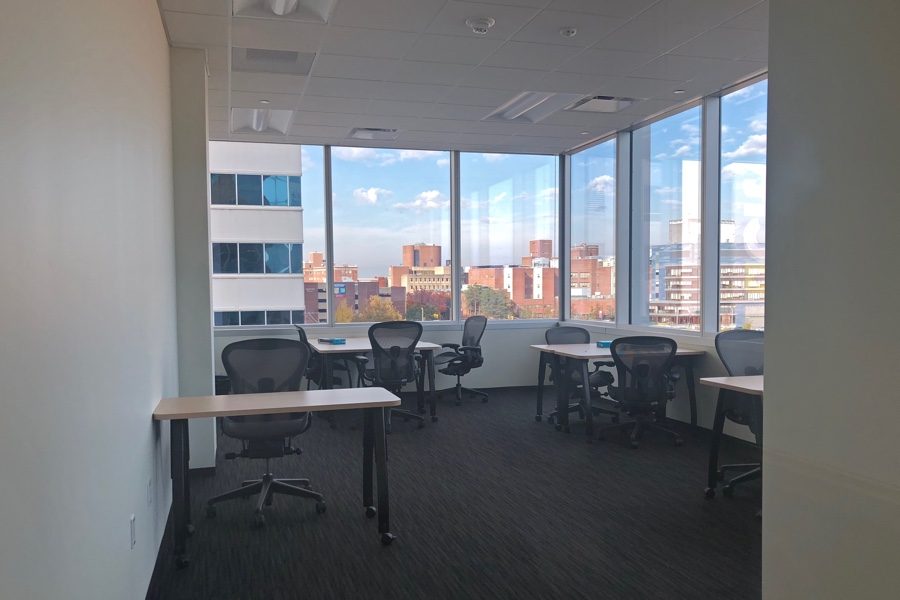
An office at CIC with wide views of West Philadelphia. Photo by Fabiola Cineas.
BizPhilly: CIC is in six other cities including Providence, St. Louis, Boston, Miami and Rotterdam. What kind of value has CIC brought to these other cities?
Morin: There are a couple of elements. One is the space that we provide for serious and serial entrepreneurs. It’s very different than just shared office space. It’s an office space that has a community of like-minded people who have the same goals. Next, CIC brings in and connects all of the other things happening in the city through partnerships, programming and events. So to put it all together, we have a home base of clientele that is already the best and brightest, the high-achievers most likely to succeed with their innovations. Then we bring everything else we can find in the city into that space. We create a center that has a much larger scale than a traditional sort of co-working or shared office space.
BizPhilly: How does CIC mold to the cities it settles down in?
Morin: There is a lot of autonomy in each center because of the cities. While they have a lot in common, they are unique. We tend to hire a lot of local talent and leadership. We’ve been trying to open in Philly for five years. It was the first spot we wanted to open. But this isn’t a real estate play. We’re coming here based on very intentional relationships with partners, universities and leadership. So once we get into a city, we have a freedom to insert ourselves wherever we feel like we might be most useful.
In Miami, for example, we have a Latin American soft landing program. We saw this as a gap because Latin American companies didn’t have the same resources as a lot of the European companies in terms of trade support and getting investment from the U.S. In Rotterdam, we have specific programs around immigration since that city is made up of a lot of people who aren’t from there. In Boston, we put in a Fab Lab to bring in more creative people from different parts of the community, not just science or tech people.
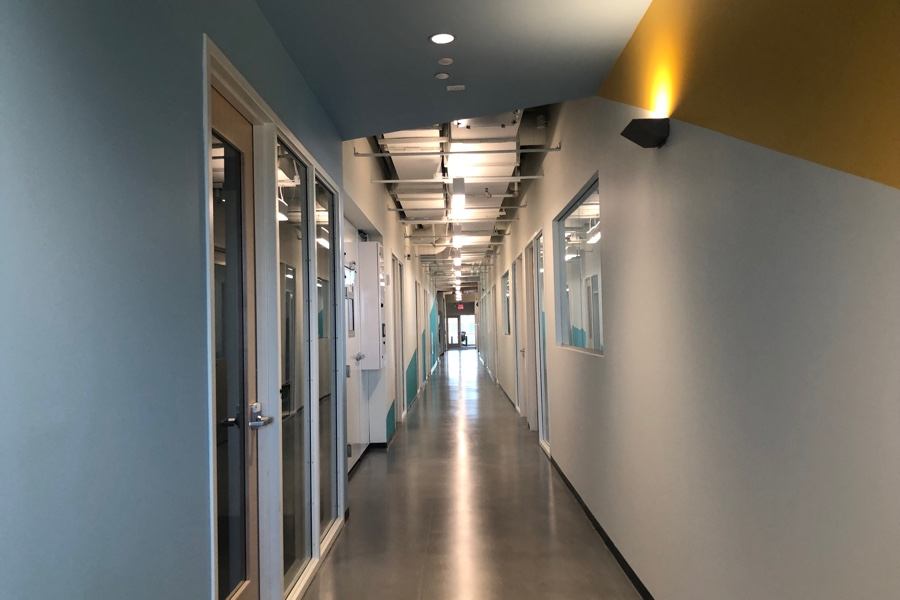
On the second floor of CIC. Photo by Fabiola Cineas
BizPhilly: How does the size of Philadelphia’s CIC compare?
Morin: They all range in size. The average size is around 100,000 square feet, but we’ll typically launch a site with 80,000 square feet or so. Providence will be a little bit smaller. Boston was smaller when we launched but is now around 120,000 square feet. In Cambridge we have over 300,000 square feet, and in my dream world, Philadelphia becomes twice that in a few years.
BizPhilly: Who do you see moving into CIC Philadelphia? Who has already signed on?
Morin: We give ourselves a couple of years to fill up. As you can imagine, hearing the story is one thing, and it’s exciting; but when a space is empty, it’s hard to really visualize that. We do have a bunch of clients signed up already. It’s in line exactly with what we were expecting, and there’s a ton of interest. We are doing multiple tours everyday. There’s especially a lot of interest in our lab, which has been great to see. I don’t want to jinx us, but it’s going much better than we could’ve hoped for in terms of interest.
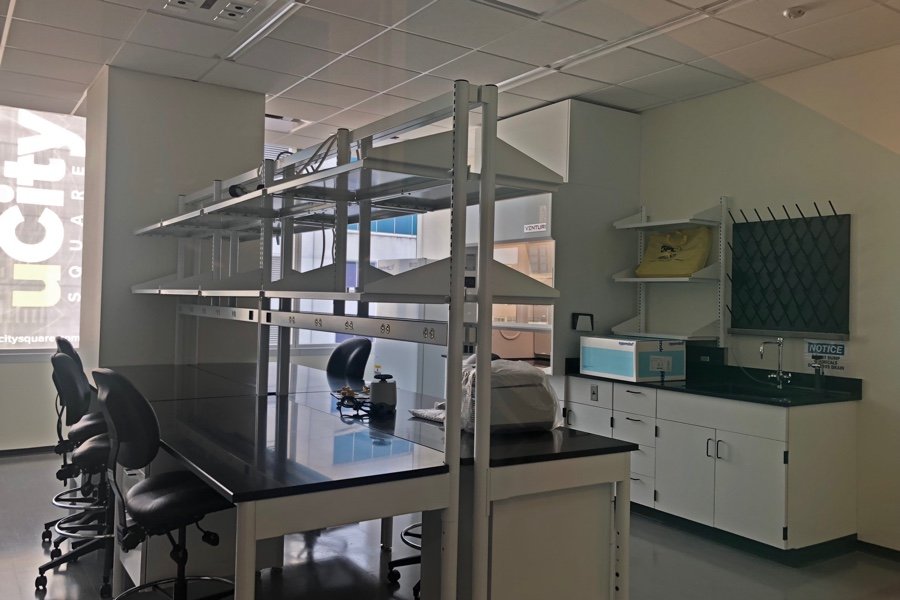
BioLabs’ wet lab space at CIC. Photo by Fabiola Cineas
BizPhilly: Do potential clients have to be a member of Philly’s life science and biotech community to join or are those just the resources that you’ve chosen to include?
Morin: We’re technically agnostic in terms of industry. Because of our partners and business and all of our cities, we tend to see companies with a life science or tech focus. But we’ve had a wedding planner in the Cambridge office and a lot of nonprofits and service providers in all our spaces, which is great.

The new Quorum space at 3675 Market Street. Photo by Fabiola Cineas
BizPhilly: What are some unique perks of Philadelphia CIC that you mention to potential clients?
Morin: If it’s not a lab client, but just someone who needs office space, I express how many resources are going to be in that one building. Our Science Center partner has Quorum programming that really feels blended into our space. Having access to all of the Quorum programming is going to be huge. We’re bringing in people so there will be office hours, and venture capitalists who move into the space. We’re not an incubator so we’re not going to guarantee any kind of resources, but there will be a lot more varied resources within CIC than would otherwise be in a regular space.
And if you’re a potential lab client, it’s really cool to be able to grab your coffee on a floor that has all of these scientists on it. And the lab space managed by BioLabs is right next to the Science Center’s First Hand program, where students will come in to learn. You can even be a mentor to them within your own office building.

A hot desk area at CIC. Photo by Fabiola Cineas
BizPhilly: How does CIC compare to other similar spaces in the market in terms of pricing?
Morin: Our co-working space, or hot desk area, is very in line. We try to keep that space on par with the market and very affordable for anyone who is looking for that type of offer. Starting price for a desk in the hot desk area is $300 per month until the end of the year and then up to $350 afterwards. We then have a ladder that goes up from there and try to have a price point that meets everyone’s needs.
That being said, we are more expensive than the typical shared office space, especially when you start getting into offices. We think that’s a good thing because of the community it attracts — that serious and serial entrepreneur. If we tour someone around who is not quite there in terms of funding, we are able to refer them somewhere else. It’s about helping people find the space that makes the most sense for them. And people are more than happy to spend a little bit more to get a lot more in terms of value.
BizPhilly: Is there any worry that you’re leaving a lot of people out at that price point?
Morin: I mean it’s going to be impossible to meet everybody’s needs, right? There
are absolutely probably early stage startups that would make better use of their financial resources by putting those funds toward something else, and that’s a good business play on their part. As I’m learning the landscape here, it seems like there are so many resources. It feels like there is a home for everyone.
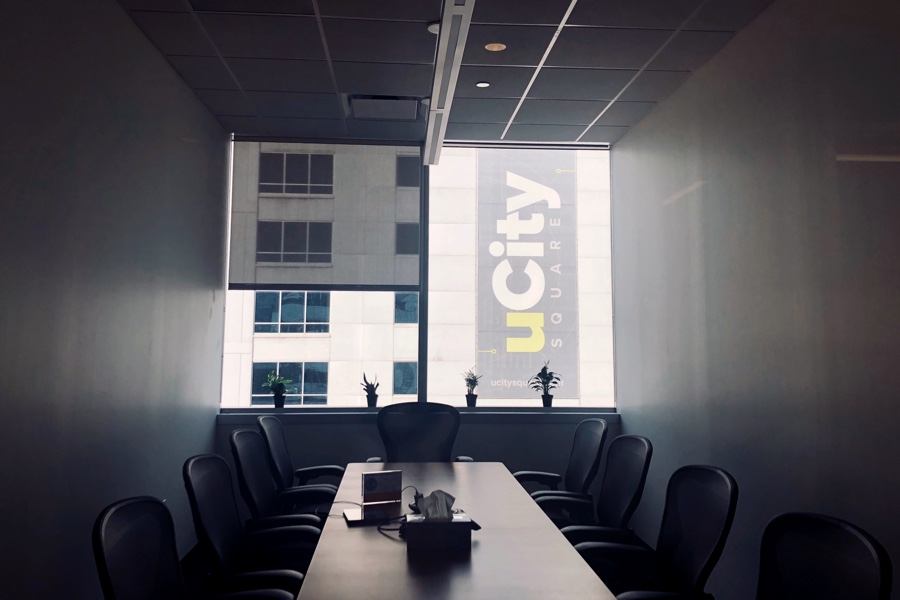
A conference room at CIC. Photo by Fabiola Cineas
BizPhilly: At this point, are you concerned about competition in the Philly market? For example, 1776 is doubling down on its commitment to being the largest network of entrepreneurial incubators in the Northeast. Is this of concern to CIC?
Morin: We’re aware of it. We think about it in terms of what is each of us is doing in the market. WeWork is so prolific right now, and I think that’s actually great because they’ve [popularized] the shared office space environment. They brought a lot of awareness to it. We are very much the rising tide floats all boats kind of company. Like I said, it took us five years to finally open in Philly. We are very thoughtful and intentional, and we are more partner and community based. We don’t really see it as competition, and we have our own goals and visions for where we want to go in the next ten years.
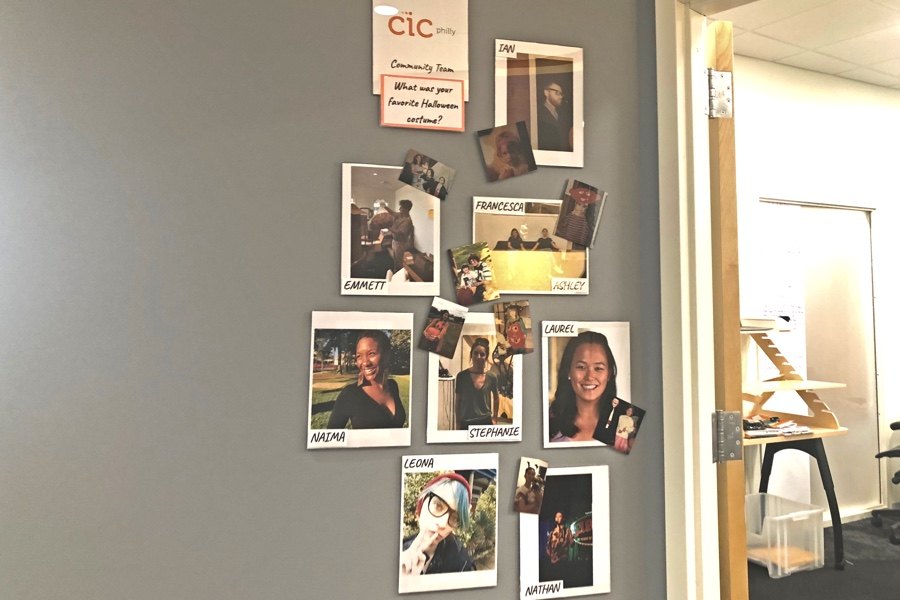
The CIC Philadelphia Community Team. Photo by Fabiola Cineas
BizPhilly: CIC often cites statistics about its ability to attract venture capital to clients. For example, in 2017, CIC and its clients received $955.4 million in VC investment. Do you see CIC as a means to draw venture capitalists to Philly who would have otherwise not been in Philly?
Morin: I hope so. That would be the dream. And everyone I’ve been talking to in the community says we can definitely use more of that. CIC is going to be one piece of what can hopefully fill a gap for companies, especially for the mid-sized companies who are getting series A and B. In our more-established sites we’ve found that the more those companies concentrate here, VC follows. We will be one aspect of what keeps turning up the dial in Philadelphia on venture capital.
BizPhilly: Do you actively facilitate connections between companies and venture capitalists?
Sometimes we’ll have a client come in on a tour, and they’ll be like, “So can you introduce me to a venture capitalist?” We’re like, “We’re not going to make any promises.” But the difference in our model is that we have a pretty high staff-to-client ratio and part of that is because every one of us here is considered a relationship builder, a people connector. We facilitate introductions when we feel like there’s a mutually beneficial fit.
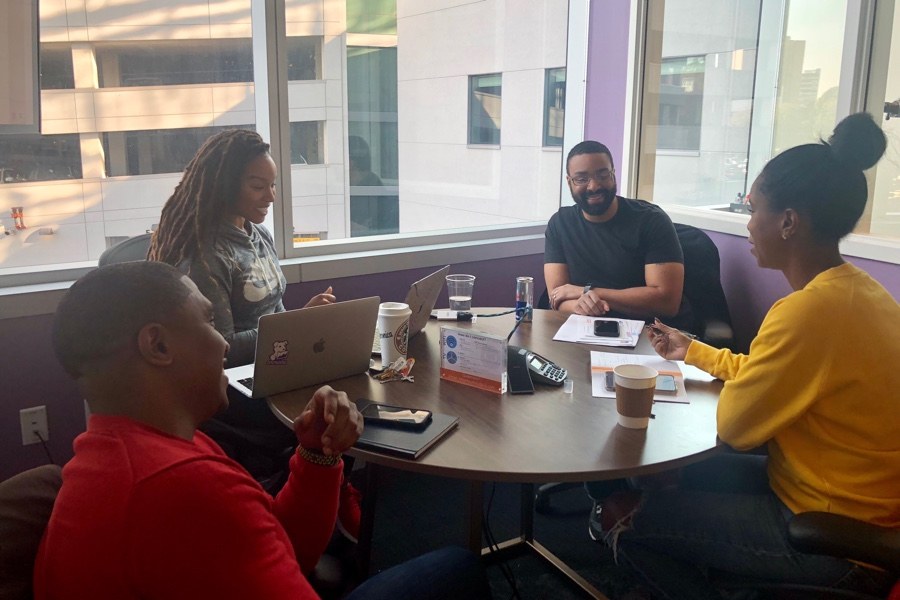
Coded by Kids founder and CEO Sylvester Mobley, second from right, meets with his Coded by Kids team in a CIC office. Photo by Fabiola Cineas.
BizPhilly: What aspects of CIC Philadelphia excite you the most?
There are two things that really excite me. One is the Venture Café space. The organization Venture Café will host regular Thursday night gatherings from 3-8 p.m. And the physical space where they will host events is also called Venture Café. The space is connected to what I think is the coolest co-working center we’ve ever designed. Philly has benefitted from the culmination of all our learnings and designs over the past ten years. It almost looks like a rock climbing gym with cool angled walls and an elevated wooden platform. And that leads right into our first-ever rooftop garden.
And the other thing I’m really excited about is building relationships with the community. Sally Guzik, our senior community engagement leader, has already done a lot of work getting us involved with partners that extend far beyond the science and technology community. We’ve gotten involved with groups like Black & Brown Founders and Coded by Kids. Part of our goal is to create a really porous center. If people in West Philadelphia are welcomed, that’s the only way that we are going to be as successful as we want to be. The whole community should be involved.


